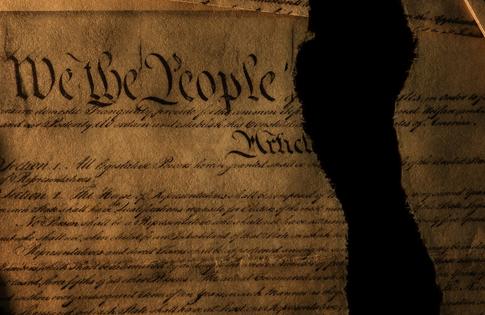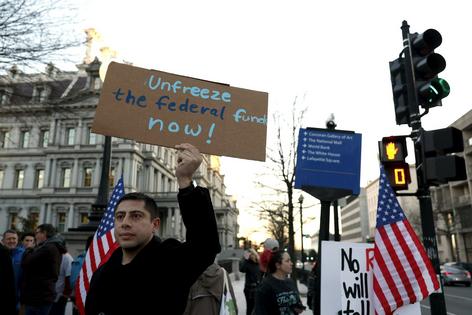3 ways Trump is acting like a king and bypassing the Constitution’s checks and balances on presidential authority
Published in Political News
I learned basic civics in my public school. But mostly, because it was more interesting, I also learned civics after school watching the animated series “Schoolhouse Rock,” often with my abuela – my grandmother – who took care of me.
Back then, “Schoolhouse Rock” had a wonderful episode, “Three Ring Government.” In singing narration, the characters explained “about the government, and how it’s arranged, divided in three, like a three-ring circus.”
Those three circles, all the same size, kept each other honest. For many in my generation, those three rings were our introduction to the idea of the checks and balances built into the U.S. government. They include the separation of powers among the legislative, judicial and executive branches.
In short, we learned, Congress passes the laws, the president administers the laws, and the courts interpret the laws.
This elegant but simple system stood in contrast to the nearly unshackled power of the British king, who ruled over the American colonies before independence. And it provided representation for “We the People,” because we vote for members of Congress.
During its first month, the second Trump administration has pushed a new balance of these powers, granting the president expansive and far-reaching authority. These actions imperil the power of elected lawmakers in the House and Senate to pass legislation, oversee the federal government and exercise spending authority.
Most U.S. legal scholars regarded these issues as fairly settled. Trump’s recent actions, however, have unsettled this understanding.
Here are three examples of how the balance of power is being upset by Trump and his administration:
On Jan. 28, 2025, President Donald Trump fired Gwynne Wilcox, a Democratic member of the National Labor Relations Board, three years before the end of her five-year term.
The National Labor Relations Board, or NLRB, established in New Deal legislation in 1935, was designed to ensure industrial peace by protecting the rights of workers to organize and bargain collectively. Congress created the board as a bipartisan body to resolve allegations of unfair labor practices brought by workers or management.
By design, the board operated independently from Cabinet-level departments. Congress sought to preserve this independence by ensuring that board members serve a fixed term and could be removed only for “neglect of duty or malfeasance in office, but for no other cause.”
This independent structure – shared by other agencies such as the Securities Exchange Commission, the Federal Trade Commission and the Equal Employment Opportunity Commission – aims to provide regulatory consistency, slightly removed from the political passions of the day.
Some legal scholars have been percolating an argument that the Constitution requires the Supreme Court to limit those agencies’ Congressionally endowed independence in favor of more expansive presidential authority, even though the court decided this issue unanimously in 1935.
Wilcox is suing the administration for its apparent violation of Congress’ statutory language by firing her.
“Ms. Wilcox is the first Black woman to serve on the Board, the first Black woman to serve as its Chair, and – if the President’s action is allowed to stand – will also be the first member to be removed from office since the Board’s inception in 1935,” the lawsuit states.
If this case makes it to the Supreme Court, and the court takes the unusual step of reversing itself, its ruling would imperil the independent structure, not just of this agency but of other agencies too.
Congress created a comprehensive system of laws for processing the asylum claims of people who say they are fleeing persecution or torture to seek protection in the U.S.
These laws allow applicants to show likelihood of harm if they could not stay in the U.S. They were originally adopted in response to humanitarian crises, including when Jews fleeing Nazi Germany were turned away by the U.S., among other countries.
As part of Trump’s declaration, on his first day in back in office, that immigration is both a “national immigration emergency” and an “invasion” under Article IV, Section 4 of the Constitution, the president essentially shut down the asylum process at U.S. ports of entry. His proclamation canceled the appointments of those who had waited to pursue their claim under existing asylum procedures.
In doing so, Trump ignored critical portions of laws passed by Congress. This move places asylum seekers already in the U.S. in danger of being deported to the countries where they say they face life-threatening persecution or torture.
Under the Constitution, Congress has the power to set spending amounts and priorities for the federal government. By law, the executive branch cannot spend what has not been appropriated – meaning approved by Congress – nor can it stop that spending.
Shortly following the inauguration, however, Trump’s Office of Management and Budget ordered a pause of federal grants and loans to organizations and programs ranging from Head Start to farm subsidies.
Almost immediately, several states, concerned about the loss of essential federal services, filed a lawsuit to halt the freeze. A federal court in Rhode Island sided with the plaintiffs and temporarily stayed the freeze.
The judge rejected the Trump administration’s argument that it must “align Federal spending and action with the will of the American people as expressed through Presidential priorities,” calling it “constitutionally flawed.” And he concluded that the president could not act unilaterally under the Constitution.
“Congress has not given the Executive limitless power to broadly and indefinitely pause all funds that it has expressly directed to specific recipients and purposes,” wrote the judge, John J. McConnell, Jr. “The Executive’s actions violate the separation of powers.”
“Schoolhouse Rock” taught that one ring must respect the other coequal rings. What has happened under Trump is one ring expanding in size to swallow up much of another ring – that of Congress.
Several of the Trump administration’s recent actions appear designed to test the legal viability of an expansive, more “kinglike” view of presidential powers.
Yet for the most part, Congress as an institution has mostly remained silent as the executive branch invades its sphere of authority.
Instead, the courts have served as a check on his power by stalling, temporarily, more than a dozen of Trump’s presidential actions that surpass the executive powers permitted under various laws and the Constitution.
Most of these stays are only temporary. They were issued based on the recognition that the immediate harm of unlawful presidential overreach would be difficult to roll back.
In the end, the Supreme Court will likely decide the scope of presidential powers in the various contexts. If they rule in Trump’s favor, the U.S. government will become a one-ring circus run by a kinglike president – precisely what it was never meant to be.
This article is republished from The Conversation, a nonprofit, independent news organization bringing you facts and trustworthy analysis to help you make sense of our complex world. It was written by: David Lopez, Rutgers University - Newark
Read more:
Congress, not the president, decides on government spending − a constitutional law professor explains how the ‘power of the purse’ works
Firing civil servants and dismantling government departments is how aspiring strongmen consolidate personal power – lessons from around the globe
Trump, Ukraine and a whistleblower: Ever since 1796, Congress has struggled to keep presidents in check
Gwynne Wilcox is a Rutgers Law grad and has spoken to our class.


























































Comments